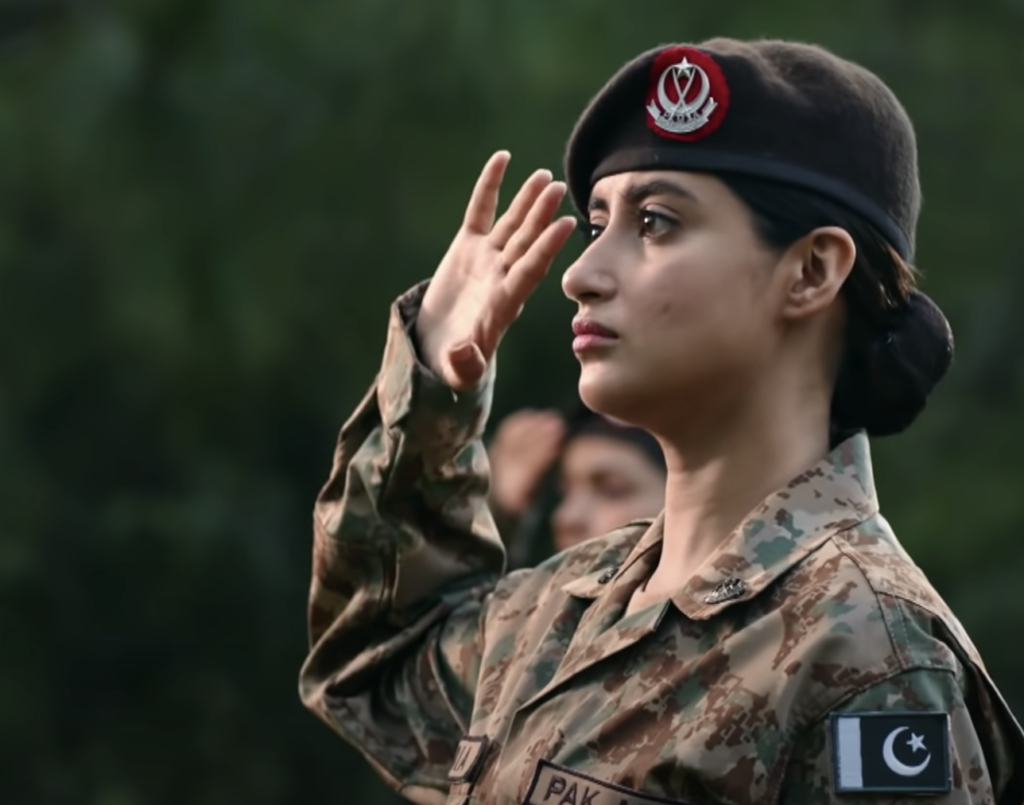The comparison of Sinf e Aahan with Ehd e Wafa is practically inevitable though unfair. Both stories were produced by ISPR, the media wing of the military forces of Pakistan, with multiple central protagonists and both shows were about the various sacrifices and social issues that dominate the lives of Pakistan’s civilians and armed forces alike. However, while Ehd e Wafa celebrated the valor and bravery of the armed forces as well as speaking to the larger complexities of a modern Pakistani landscape, Sinf e Aahan is inherently focused on the trials and tribulations within the Pakistan Military Academy.
Ehd e Wafa, which was written by Mustafa Afridi and directed by Saifee Hasan, charted the story of four boys (Osman Khalid Butt, Ahad Raza Mir, Ahmed Ali Akbar and Wahaj Ali) throughout their lives, beginning from their lives at a military cadet college. Sinf e Aahan, written by Umera Ahmed and directed by Nadeem Baig, focuses on five young women (Sajal Ali, Yumna Zaidi, Ramsha Khan, Kubra Khan and Syra Yousuf) who come from different segments of Pakistani society and join at Pakistan Military Academy aka PMA.
Sinf e Aahan, twelve episodes down, had begun with a bang. Umera Ahmed, with her clear and sharp understanding of human nature and subtleties of Pakistani society, told multiple stories with a lot of ethos and compassion.
Sajal Ali plays Rabia Safeer, a bright young girl whose family just can’t get the right boy for her to get married. Kubra Khan plays Mahjabeen Mastan, a spoilt but kind-hearted upper class young woman whose parents constantly fight and she seems to be living a purposeless life. Pariwash Jamal, played by Ramsha Khan, is a feisty young woman from Sibbi, Baluchistan, whose father is a common Balochi citizen whose lands is under the grasp of the local tribal leader. Yumna Zaidi plays Shaista Khanzada, a brave and confident young woman from Khyber Pakhtunkhwah, whose aim in life is to become an army officer. Syra Yousuf plays Arzoo Daniel, a young Christian woman, whose life turns around after she joins PMA.
The cast is also supported by Sri Lankan actress Yehali Tashiya Kalidasa (who plays a Sri Lankan cadet in an exchange program) and Dananeer Mobeen (of the ‘pawri ho rehi hai’ fame) as fellow female cadets. The story has another angle that has developed in the past few episodes: Sheheryar Munawar and Sonia Mishal play Captain Usama and wife. Sonia Mishal’s character has a traumatic past with which she is still struggling with.
From the moment the story began to the point it has reached now, the pace of the show is what it struggles with the most. While many of the core ideas of the show are powerful and can evoke the needed emotions, it hammers in the message repeatedly which makes the characters and the idea lose their essence.
By episode 12 in Ehd e Wafa, Ahad Raza Mir was the only character from the storyline who sticks around in the Military Academy whereas the rest of the protagonists have gone their separate paths. Within the academy itself, Ahad was flanked by the charming Adnan Samad Khan who played Gulzar from Dera Ghazi Khan, who provided much of the comedy relief. His humble origin story, delivered in a matter-of-fact, relatable way did not need heavy statements or complex background music: it spoke for itself.
The dialog was stronger, the characters moved at a much faster pace and small powerful subplots were added to keep the audiences riveted. Sinf e Aahan focuses far too much on emotional slow-motion shots of the young women within the academy with heavy dialogs and very little comic relief.
Even if the story was to be confined within the limitations of PMA and whether it was the intention to show the grit and dedication it takes to be a soldier in Pakistan armed forces, the story could have taken more subplots and more character depths into consideration. The rivalry between ex-best friends (Rabia and Mahjabeen are shown to have a history over Rabia’s brother, played by Usman Mukhtar) and Nathmi (Kalidasa) pretending she doesn’t know Urdu are tepid since they’ve been played out for far too long. While interesting in theory, due to the stretching of episodes, the impact is squandered.
The superb cast is mostly what is saving the show now. Sajal Ali’s soulful eyes and impeccable comedic timing, Yumna Zaidi’s hilarious yet candid dialog delivery, Syra Yusuf’s graceful persona, Ramsha Khan’s dignified portrayal, Kubra Khan’s subtle changes in her attitude as time grows, and Sheheryar Munawar as the graceful Captain Usama make Sinf e Aahan still a better show than most. The message of the show is noble enough, the various sacrifices men and women of the country make for their land and while it may look glamorous from the outside, it takes a lot of physical, emotional, and professional training to achieve what cadets do. However, this deserved a better screenplay. Ehd e Wafa set the standard far too high and one can only hope that the upcoming episodes of Sinf e Aahan pick up the pace and show us more than the female protagonists simply struggling to pass out of cadet college.
